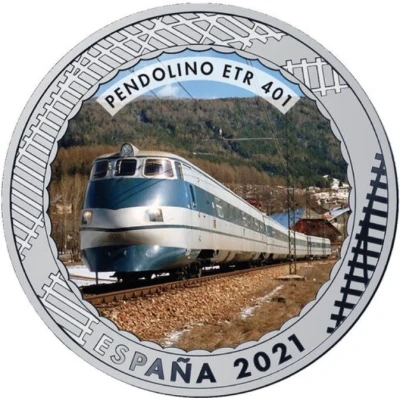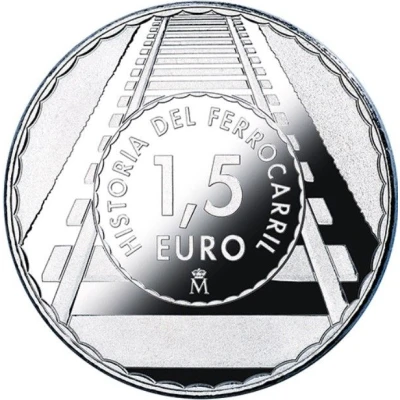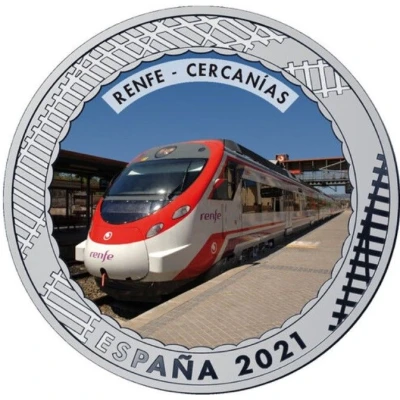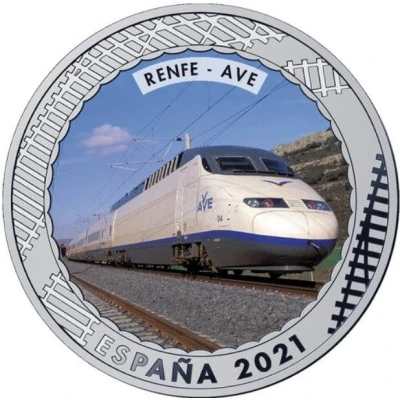
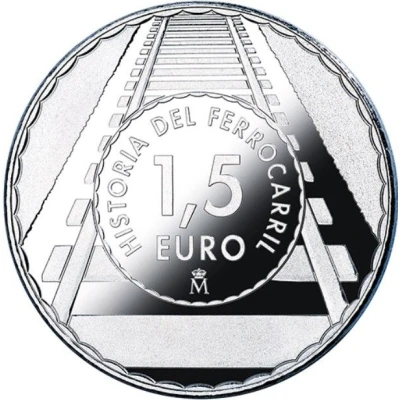

© Real Casa de la Moneda
1.5 Euro Renfe - AVE
2021 year| Copper-nickel (75% copper, 25% nickel) | 15 g | 33 mm |
| Issuer | Spain |
|---|---|
| King | Felipe VI (2014-date) |
| Type | Non-circulating coin |
| Year | 2021 |
| Value | 1.5 Euro 1.50 EUR = USD 1.65 |
| Currency | Euro (2002-date) |
| Composition | Copper-nickel (75% copper, 25% nickel) |
| Weight | 15 g |
| Diameter | 33 mm |
| Shape | Round |
| Technique | Milled, Coloured |
| Orientation | Medal alignment ↑↑ |
| Updated | 2024-10-07 |
| Numista | N#320111 |
|---|---|
| Rarity index | 90% |
Reverse
Series and face value inside a central circle. Outside the central circle, an image of a railway track.
Script: Latin
Lettering:
HISTORIA DEL FERROCARRIL
1,5 EURO
M
Translation: History of railways
Edge
Plain
Comment
For the year 2021, since the European Year of the Rail and the 80th Anniversary of Renfe are celebrated, the FNMT-RCM issues a collection of 20 coins dedicated to the History of the Railways. This series reproduces a selection of trains and locomotives that have been relevant throughout its history.Renfe - AVE: The history of the Spanish railway changed direction in December 1987 when the government decided to link Madrid and Seville with a high-speed railway track, with a track gauge of 1,435 mm and a length of 471 m. Later, Alstom was tasked with the construction of the trains that would deliver the service. In “indeformable M+8 R+M” formation, these trains had evolved from the SNCF TGV-Atlantique. Adapted to meet the needs of Spanish railways, their traction was concentrated in two driving heads; the intermediate trailers had shared bogies; top speed was 300 km/h; and seating capacity totalled 329, divided into three classes: club (38); preferential (78); and tourist (212), plus one place for passengers of limited mobility. There are eight autopilot three-phase synchronous motors per set, attaining maximum power of 11,950 hp (8,800 kW).
The first of these trains was received by Renfe in November 1991, the full lot being assigned to Series 100-001-016. As the high-speed infrastructure had been completed in record time, the Madrid-Seville line, along with the trains belonging to this series, was inaugurated with a special journey for the authorities on April 14 1992. One week later, on April 21, the Spanish high-speed train, known as the AVE, made its commercial debut.
Once the service was under way, the speed was increased in some sections to 300 km/h, reducing travel time to two hours, 20 minutes. On April 23 1993, the 100-015 train reached a record speed of 356.8 km/h at pk 106/200, a straight section near Los Yébenes (Toledo).
From 2007 to 2009, the cars were refurbished: the seats were reupholstered and each one was fitted with a 220 V socket. In 2011, Renfe awarded Alstom the contract to adapt the carsets belonging to Series 100-015-024 for the provision of international services between Spain and France. Totalling 10, these carsets were also fitted out to run at 1,500 V and the driver’s cab was equipped with the instruments necessary to operate with the French signalling and safety systems.
Interesting fact
The Renfe - AVE 1.5 Euro coin from Spain features a unique design that showcases the country's high-speed rail network, known as the AVE (Alta Velocidad Española). The coin's design includes an image of a high-speed train and a map of Spain in the background, highlighting the routes covered by the AVE network. This coin is a great collector's item for anyone interested in trains, transportation, or Spanish culture.
Price
| Date | Mintage | VG | F | VF | XF | AU | UNC |
|---|---|---|---|---|---|---|---|
| 2021 M | 7000 | - | - | - | - | - | - |
Values in the table are based on evaluations by sales realized on Internet platforms. They serve as an indication only for 1.5 Euro (Renfe - AVE) 2021 coin.
